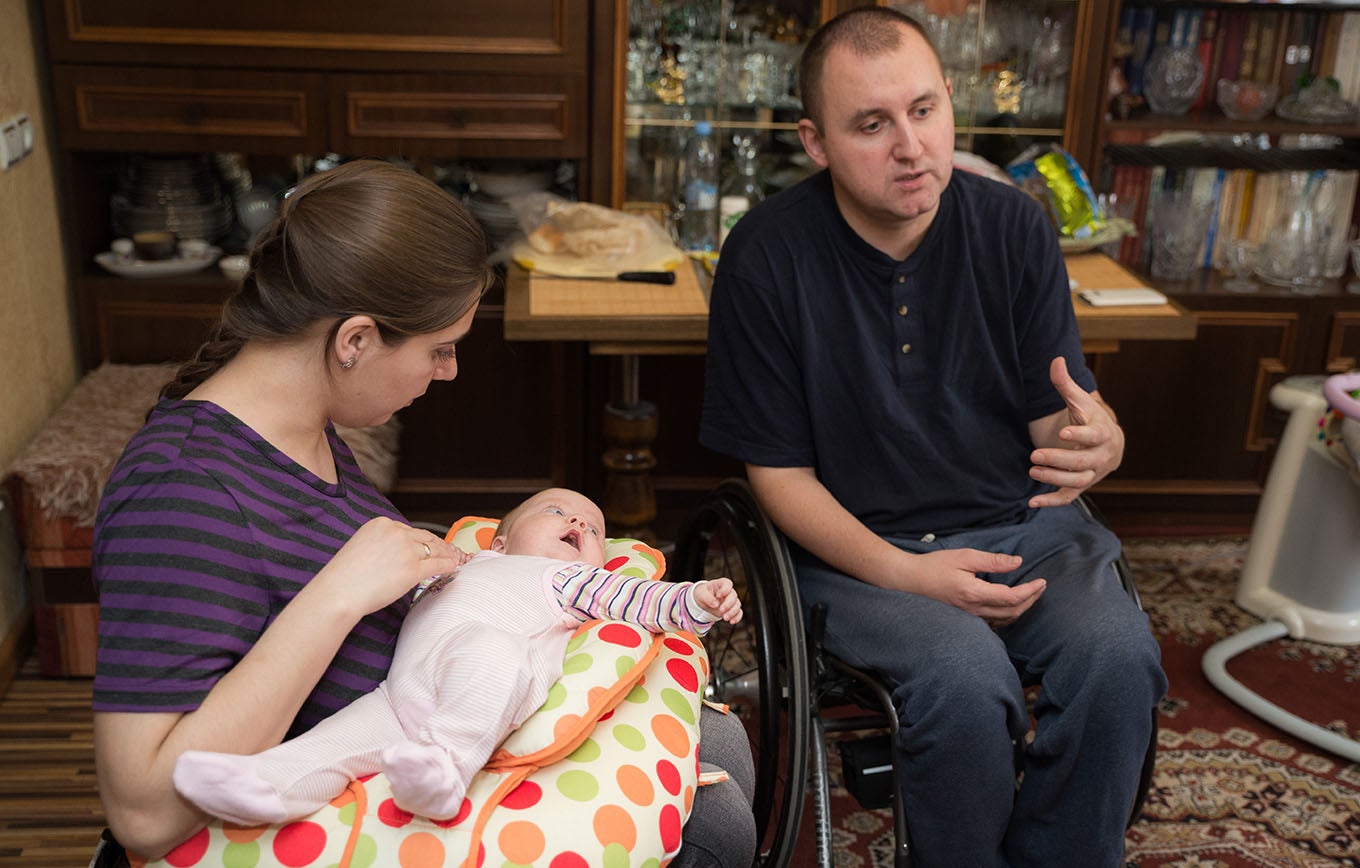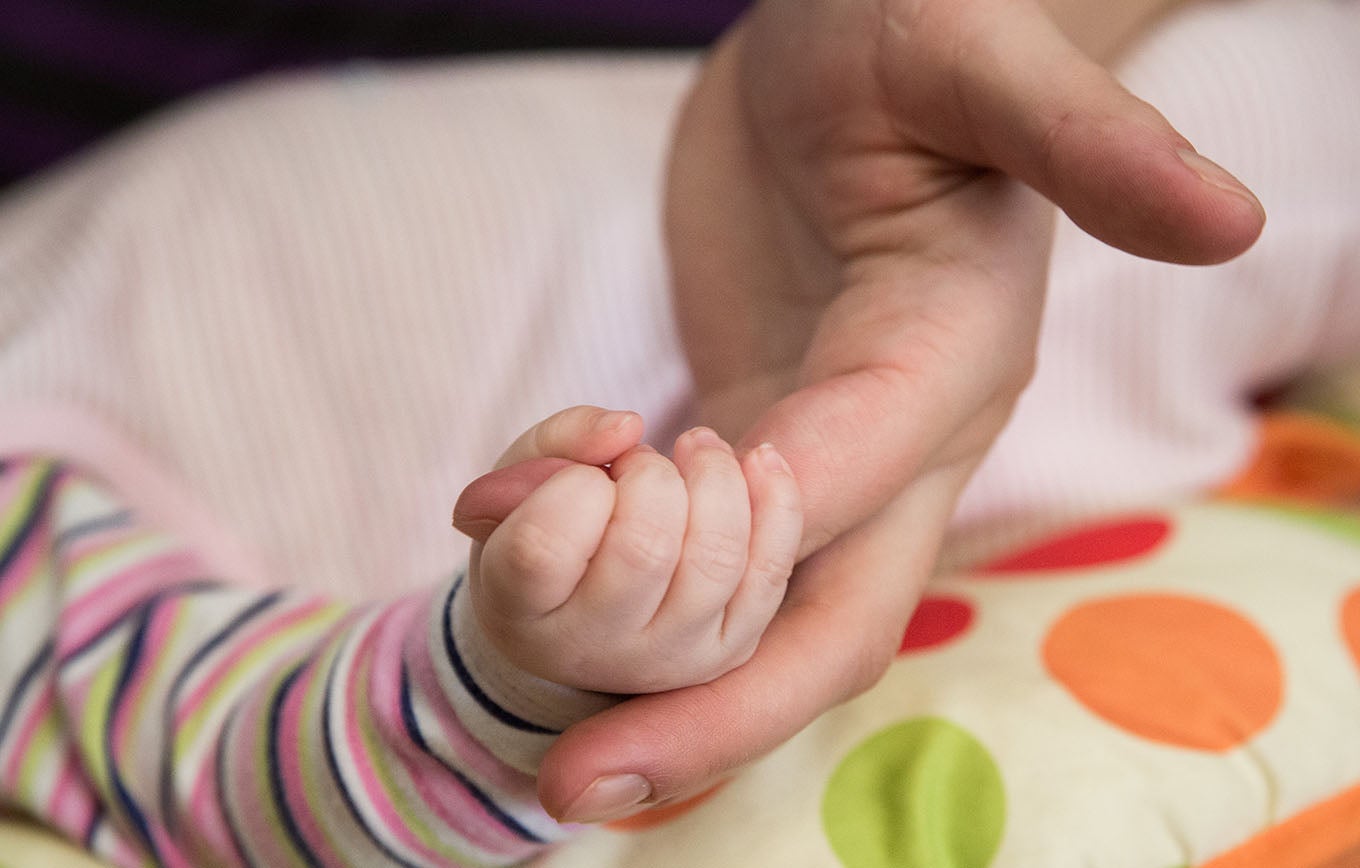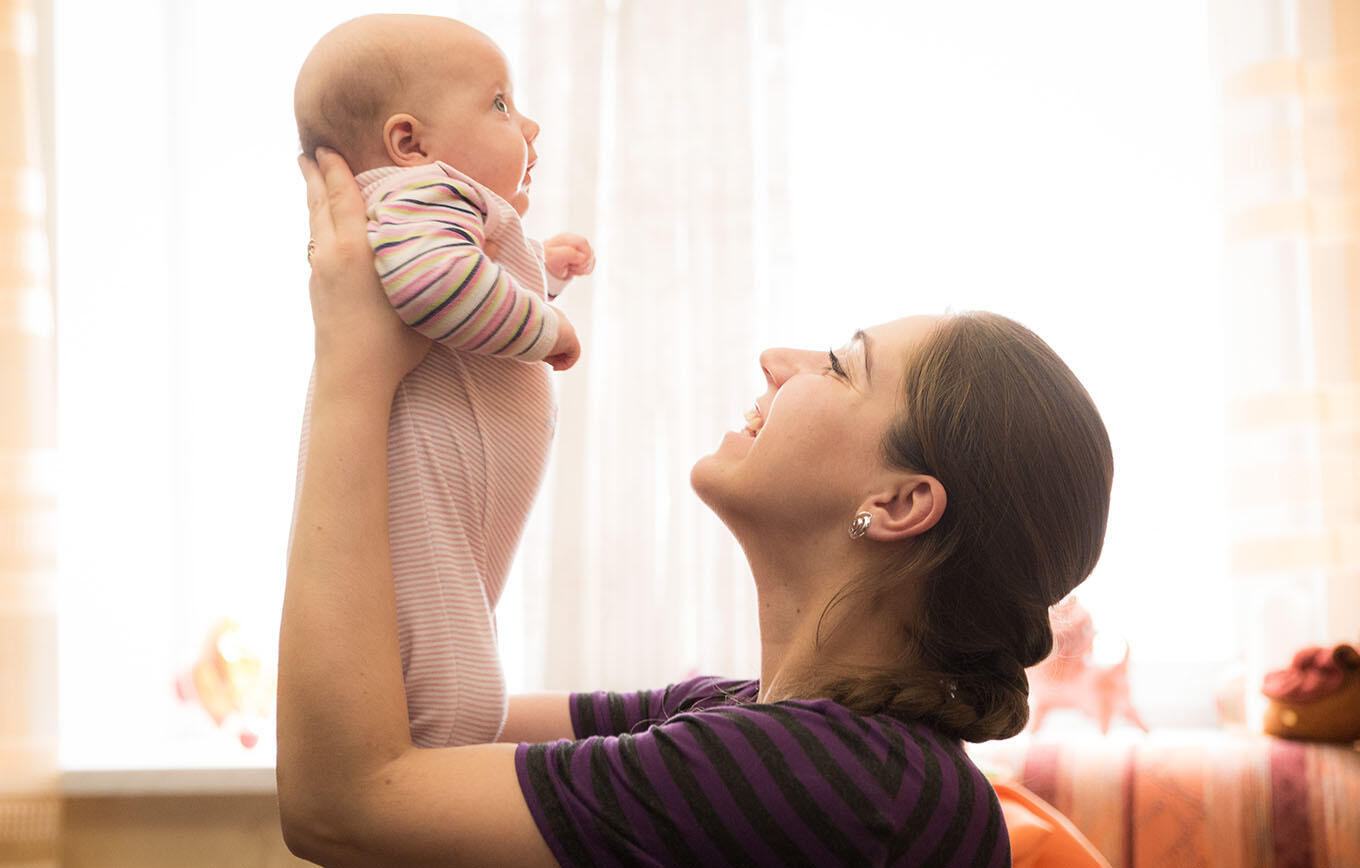MOZYR, Belarus — When Anya Shevko, 29, became pregnant, she had to weigh herself at a purchasing centre for recyclable materials because the maternity clinic in her city did not have suitable scales. Even visiting the clinic at all was difficult, because Anya is in a wheelchair – and so is her husband, Zhenya, 36. But the couple persisted, and when their daughter was born late last year, they became the first wheelchair users in Mozyr to start a family.
“Many people, even doctors, don’t believe that people with disabilities can become parents. They may think we deserve pity and assistance, but they don’t think we deserve this,” says Zhenya, who fractured his spine in a diving accident at the age of 18. “Because of these attitudes, many people with disabilities believe they are not worthy or able to raise a child.”
“I’ve talked to a lot of other female wheelchair users who were discouraged from continuing their pregnancies,” adds Anya, who fell out of a fifth-floor window when she was 14 years old. “Some of their doctors even forbade them from giving birth, saying they would do themselves harm or have a miscarriage, and advised abortion for medical reasons. I’m lucky that my gynaecologist did not try to dissuade me when I told her I was pregnant.”
There are approximately a half a million people with disabilities in Belarus, representing 6.6 per cent of the adult population and 1.5 per cent of the child population. Among them are an estimated 20,000 wheelchair users, with 400 more people becoming wheelchair-bound each year. Belarus was the last country in Europe to ratify the Convention on the Rights of Persons with Disabilities, in 2016, and there is still no state programme to inform people with disabilities about their reproductive health. As a result, couples like Anya and Zhenya often lack information about physiological issues around sex and pregnancy, and do not realise that people with limited mobility also have the right to have children.
Sexual and reproductive health without stigma
“People with disabilities are often regarded as an object of rehabilitation, as someone in need of help, but not as full-fledged members of society,” says Elena Kasko, Assistant Representative of UNFPA in Belarus. UNFPA works throughout Eastern Europe and Central Asia to ensure that every person has the right to full and accurate information on sexual and reproductive health along with access to related services, including an environment free of barriers, stigma and stereotypes.
“When we talk about people with disabilities, we often ignore the problems associated with sexual life. It is high time to think about this issue in Belarus and take action to improve the situation,” UNFPA Country Director Caspar Peek said after Belarus ratified the Convention on the Rights of Persons with Disabilities.
Neither Anya nor Zhenya has waited for government agencies to take action to improve the situation of disabled persons in Belarus. Initially after her accident, Anya did not leave her family’s home for two years, because of the physical barriers, and because she thought that people like her never left their apartments. But once she learned that Mozyr had a branch of the Republican Association of Wheelchair Users, she almost immediately became an activist with the organisation, participating in sporting events, working as an instructor in the summer camp for active rehabilitation, and teaching computer literacy courses for wheelchair users. It was through these activities that she met Zhenya, who is now the chair of the 1,500-member association as well as a member of the Republican Interagency Council on the Problems of People with Disabilities, which advocates for the creation of a barrier-free environment.

The Shevko family at home. Photo: Denis Zelenko
The couple faced new challenges when they decided to have a child, due to both the lack of information and professional support for disabled persons who want to give birth, and to the physical barriers to accessing medical institutions. They also worried that any child they had might be taken away from them, as nearly happened to a disabled couple in another Belarusian city who had to fight against the authorities to keep their baby with them at home. But Anya and Zhenya say they have never regretted their decision.
“When I got pregnant, my parents were a little scared, and so were we. But we absolutely did not have any doubts. I knew I wanted a child,” Anya says.
Anya diligently went to the sole maternity clinic in Mozyr for her monthly check-ups, but struggled to receive all the services she needed there. She successfully lobbied for the clinic to construct a wheelchair ramp, but it still had no elevator, and crucial facilities such as the clinic’s ultrasound machine, its toilet and its modern, height-adjustable gynaecological chair were all located on upper floors of the building.
“It was absolutely impossible to go through a full medial examination,” Anya says, recalling how she had to travel to the city’s maternity hospital for her ultrasound, and have a male doctor carry her upstairs at the clinic to its second-floor examination room. She wanted to attend courses for pregnant women, but all the ones she could find were located in wheelchair-inaccessible buildings, so she and Zhenya prepared for parenthood themselves, researching online and contacting specialists from Minsk.
Breaking taboos
The couple is also working to make sure other people like them have more equitable access to information about pregnancy, childbirth and parenting through the summer camps that they help organise with the Republican Association of Wheelchair Users. The camps, which are supported by the Ministry of Sports and Tourism, also provide new wheelchair users with the skills and knowledge to operate their wheelchairs, travel on public transport, obtain their legal rights and live more independently.
“Sex and childbirth are among the very important topics in our camps,” says Anya. “There is a special lecture and presentation about this to try and break the taboo around this topic, to explain the options for conceiving and convey positive examples.”
“Our organisation is the only one in Belarus that actually provides such information for wheelchair users,” adds Zhenya. “Experience and studies in other countries show that wheelchair users can give birth to children without medical complications.”
Before their daughter was born, Anya and Zhenya travelled to Minsk, where there was a more disabled-accessible hospital with doctors who had experience delivering babies for women with spinal-cord injuries. “The maternity hospital in Mozyr said they would carry me to the toilet, to the shower, but I didn’t want to be carried; I wanted to do things on my own,” Anya says.
On 2 November 2016, Anya gave birth to a healthy baby girl, who the couple named Nastya.

Photo: Denis Zelenko
“The delivery went well, but afterwards, it was difficult — everything was made for a healthy person of normal height,” Anya says. “Changing Nastya’s diapers was very difficult and uncomfortable. I spent several days just sitting in my wheelchair, holding Nastya in my arms, because the hospital bed was too narrow for both of us and the cradle’s sides were too high for me to reach in to put her down and take her out.”
Anya needs more time and effort than other moms to perform simple actions such as putting her daughter to bed. But the young family is thriving. Zhenya was able to take a paternity leave, and Nastya’s grandparents help take care of the young girl. The family has a minivan designed for wheelchair-bound drivers, and a specially adapted baby stroller that can be attached to a wheelchair frame. They still have many questions about the future – will they be able to get the same childcare support that is provided to parents of a disabled child? How will they balance family responsibilities with work? Will they be able to take Nastya to a playground on their own?
But despite these uncertainties, they are already excited about the prospect of giving Nastya a brother or a sister.
“We are planning to have a second child. The doctors say there are no contraindications, and after two years we can easily try again,” Anya says with a smile.
“We have friends in other cities who have given birth as wheelchair users. Their grown-up children are so kind and tolerant,” she adds. “They have seen people with disabilities from an early age, so they can see that we are normal people, just like everyone else: people who also work, study, cook, drive cars and become parents.”
The original version of this article was written by Maria Sysoy, with photographs by Denis Zelenko, and published in Imena Magazine’s March 2017 issue. This version has been published by UNFPA as part of the regional launch of The State of World Population 2017.


